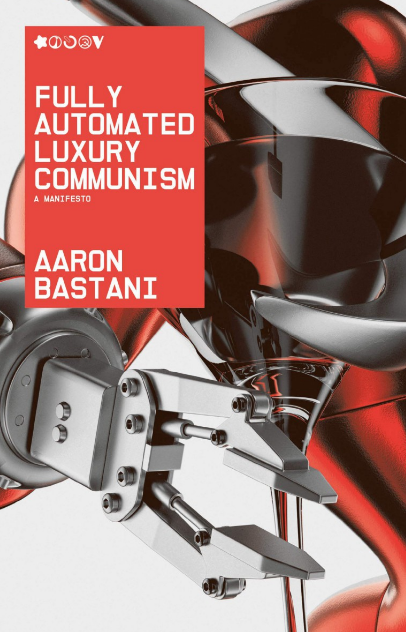
Five impending catastrophes:
- climate change and the consequences of global warming;
- resource scarcity – particularly for energy, minerals and fresh water;
- societal ageing, as life expectancy increases and birth rates concurrently fall;
- a growing surplus of global poor who form an ever-larger ‘unnecessariat’;
- a new machine age which will herald ever-greater technological unemployment as progressively more physical and cognitive labour is performed by machines, rather than humans.
Productivity is for robots - Kevin Kelley
If information goods are to be distributed at their marginal cost of production – zero – they cannot be created and produced by entrepreneurial firms that use revenues obtained from sales to consumers to cover their costs. If information goods are to be created and produced … (companies) must be able to anticipate selling their products at a profit to someone. -Delong and Summers
…While wanting to all but eliminate workers from production in order to save money, Ford also wanted to maintain demand for the company’s products, now made more efficiently than ever. Simply put, Ford wanted cheap employees but affluent consumers…
(reminiscent of Reid Hastings)
Neoliberalism: market driven ideology - let the markets decide.
… Only now are these innovations bringing extreme supply to information, labour and resources. In so doing, they undermine two core presumptions about capitalism: firstly, that scarcity will always exist; and secondly, that goods will not be produced if their marginal cost is zero. They are – and conventional economics can’t explain it…
…‘Communism’ is used here for the benefit of precision; the intention being to denote a society in which work is eliminated, scarcity replaced by abundance and where labour and leisure blend into one another…
Peak human: the point in time when the value of our labor begins to trend to zero. Probably ~1970. Peak horse was ~1900.
…Japan’s unmanned Hayabusa spacecraft successfully landed on the 25143 Itokawa asteroid in 2005, returning to Earth with samples of material from its surface five years later. In 2014 the Japanese Space Agency launched a successor mission, Hayabusa 2, with the asteroid 162173 Ryugu – widely viewed as the most cost-effective option for asteroid mining – its intended destination. Hayabusa 2 landed in June 2018 and is expected to return to Earth with samples some time in 2020….
…The answer to all three enquiries begins with an admission. While the tendency to extreme supply means everything will become permanently cheaper – from food to transport and clothing – all as a result of each factor of production falling in price thanks to the central role of information, in the absence of an appropriate politics this will only lead to novel forms of profiteering. Marx expressed this perfectly when he wrote, ‘The most developed machinery thus forces the worker to work longer than the savage does, or than he himself did with the simplest, crudest tools.’…
…A green politics of ecology without a red politics of shared wealth will fail to command popular support. Conversely, the promise of red plenty based on fossil fuels and resource scarcity will fall victim to climate breakdown…
…To the green movement of the twentieth century this is heretical. Yet it is they who, for too long, unwisely echoed the claim that ‘small is beautiful’ and that the only way to save our planet was to retreat from modernity itself. FALC rallies against that command, distinguishing consumption under fossil capitalism – with its commuting, ubiquitous advertising, bullshit jobs and built-in obsolescence – from pursuing the good life under conditions of extreme supply…
…This break must start by switching off the privatisation and outsourcing machine. The reason why is simple: its prevailing logic demands that every public good – from healthcare and education to housing – be sacrificed on the altar of private profit and shareholder value. In this respect privatisation and outsourcing must be viewed as two sides of the same coin. While the former has taken centre stage in undermining the state’s provision of public goods – with whole industries privatised en masse over the last fifty years – the latter has proven equally effective in funnelling private profits while maintaining a veneer of public ownership and accountability. The consequences of this have been to make workers poorer and degrade services, often in the name of ‘consumer choice’, while draining communities of local wealth and know-how….
…There the response to a budgetary crisis had been heterodox and unprecedented, with local government refusing the default medicine of privatisation and outsourcing – focusing instead on energising the city’s economy through the procurement of ‘anchor institutions’ like schools, hospitals and universities. In time it proved a success, so much so that the approach came to be titled the ‘Cleveland Model’…
Public goods: healthcare, education, democracy and legal services, shelter, food, transport and information. Universal Basic Services (UBS)
Enforced scarcity
…it is harder to build a machine that can wash the dishes than one that can solve complex mathematical problems. This contradiction is known as Moravec’s Paradox…more ‘processor power’ is actually required for managing what we have historically considered to be low-level tasks for humans, such as motor-sensory coupling, spatial awareness and unanticipated responses…